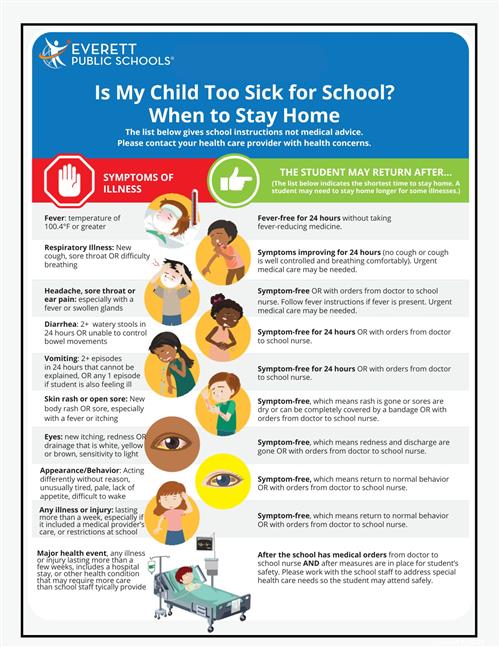- Everett Public Schools
- Is My Child Too Sick To Go To School?
Health Services
Page Navigation
-
Is My Child Too Sick To Go To School?
Because we care about protecting students and their families from contagious diseases, we ask that you keep your student home when they are sick. Keeping ill students at home and encouraging frequent hand washing protects all. While we regret any inconvenience this may cause, following these guidelines will result in fewer absences and less illnesses overall.
In order for us to continue to provide a safe learning and work environment for our students, staff and families, we want to remind you to:
- Please keep an ill student home, or make arrangements with a caregiver, when signs or symptoms of illness are present.
- Students with symptoms of illness at school may place other students at risk of illness and will need to be picked up promptly.
- Please notify us if your student has a contagious illness. An exposure may be life‐threatening for others with fragile immune systems or certain medical conditions.
- Your student's health information will be treated confidentially.
We encourage you to seek medical advice if you have any questions about sending your student to school. If your student begins to show any of the signs of illnesses, it will be necessary for you to pick up your student.
If your student is experiencing symptoms of a respiratory virus please see additional resources HERE.
Please contact your school nurse if you have other questions or concerns. To contact your child's School RN, please click HERE.
Symptoms of General Illness
APPEARANCE, BEHAVIOR- Unusually tired, pale, lack of appetite, difficult to wake, or confused/irritable.
EYES- If there is drainage, vision change, and/or redness of the eyelid, itching, pain or sensitivity to light. This may be a sign of "pink eye" (conjunctivitis) and the student should be checked by a health care provider.
FEVER- Temperature of 100.4 degrees Fahrenheit or higher. Students need to be fever free (WITHOUT fever reducing medication) for 24 hours before returning to school. Giving fever-reducing medication just before returning to school does not make a student well, it only masks the fever until the medication wears off. In this situation, a student needs to be home so others are not exposed to illness.
COLD AND/OR COUGH- Students need to be able to cover their cough to be at school. If a cough or cold persists for more than 2 weeks, the student may need to be seen by a health care provider.
PERSISTENT NASAL DRAINAGE AND/OR CHRONIC COUGH – May need to be seen by a health care provider; these may be signs of a condition that may spread to others and require treatment.
DIARRHEA- 2 or more watery stools in 24 hours, especially if the student acts or looks ill. Students should stay home for 24 hours after the last watery stool.
VOMITING- Vomiting 2 or more times in 24 hours. Students should stay home for 24 hours after the last time they vomited.
RASH- Bothersome body rash, especially with fever or itching. Some rashes may spread to others and should be checked by a health care provider.
SORE THROAT – Especially with fever or swollen glands in the neck. A student with a confirmed diagnosis of strep throat may return to school after 24-hours of appropriate treatment.
INJURY/SURGERY - if students are unable to concentrate due to pain or pain medication, they should stay home. Please have your health care provider contact the school nurse to help your child safely return to school. Letting the school nurse know in advance of any planned surgery will be helpful.
STILL HAVE QUESTIONS about whether or not your student is healthy enough to come to school? Contact the school nurse or your child's health care provider.
Thank you for your support to keep all students safe & healthy,
-The Everett School District Health Services Team


